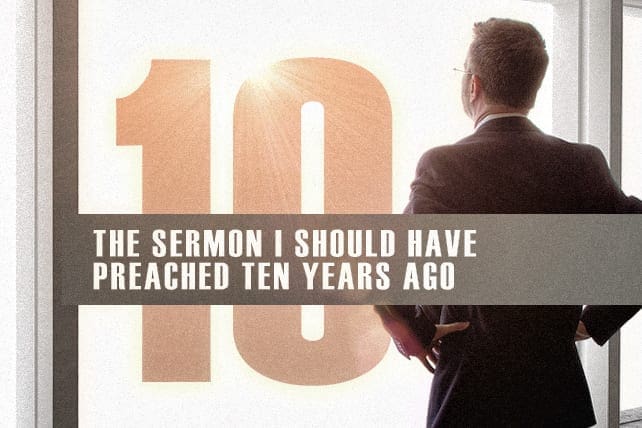The Sermon I Should Have Preached Ten Years Ago

If
Malcolm Gladwell is correct and it truly takes 10,000 hours to become
an expert at something, I should have the art of preaching down. By this
point in my life, I’ve preached several hundred sermons and put in
thousands of hours in message prep. Yet, not only do I not feel like I
have it […]
Yet, not only do I not feel like I have it down, but I’m waking up to the reality that the “art” I’ve been doing for most of my sermonic life may have been closer to heresy than I would like to admit.
Let me explain.
The model of sermon preparation and delivery that I modeled during my early years as a pastor taught me a consistent rhythm for teaching the Bible. It went like this: Pick a behavior that you would like people to do or not do, find a verse in Scripture to support this behavioral change, tell a story that elicits emotions of guilt or regret, and invite the audience to respond by doing what you’ve told them to do.
So that’s what I did. Hundreds and thousands of times. I taught people how to obey a wide assortment of biblical commands: control their tongues, avoid temptation, maintain sexual purity, love others, serve the poor, give generously and so on.
And then I would wonder why those I spoke to were so prone to indulge in the very acts I had so eloquently taught them to avoid. The problem did not seem to be in my delivery, in my illustrations or in my clever use of stories. I could not put my finger on the problem.
My failure can be seen in two different ways to teach a familiar story about Jesus. Luke 5 and Matthew 4 both tell the story of Jesus’ call of his original disciples. Matthew 4:18–22 reads:
While walking by the Sea of Galilee, he saw two brothers, Simon (who is called Peter) and Andrew his brother, casting a net into the sea, for they were fishermen. And he said to them, “Follow me, and I will make you fishers of men.” Immediately they left their nets and followed him. And going on from there he saw two other brothers, James the son of Zebedee and John his brother, in the boat with Zebedee their father, mending their nets, and he called them. Immediately they left the boat and their father and followed him.
My typical sermon on discipleship would be the one that goes, “Follow Jesus. Give up everything. What are you waiting on?” These exhortations are certainly valid. They need to be preached.
The problem is I can’t even obey my own sermon if that’s all I preach—and neither can my church.
It seems that Jesus starts in a different place than I’m prone to, a truth that is seen clearly by re-reading Matthew 4.
While walking by the Sea of Galilee, he saw two brothers, Simon (who is called Peter) and Andrew his brother, casting a net into the sea, for they were fishermen. And he said to them, “Follow me, and I will make you fishers of men.” Immediately they left their nets and followed him. And going on from there he saw two other brothers, James the son of Zebedee and John his brother, in the boat with Zebedee their father, mending their nets, and he called them. Immediately they left the boat and their father and followed him.
The text doesn’t start with obedience, the text starts with the gracious, meritless call of God. He doesn’t recite moral platitudes, he doesn’t prey on their sensibilities, he doesn’t lure them with guilt or shame—rather, he calls them. The text gives no basis for the call other than the goodness of God Himself, embodied in Jesus Christ, who chooses to love those who are dead, lame, dull and incapable of obeying God rightly.
The generous, benevolent, overwhelming goodness of God in calling out fallen humanity is the precursor to any act of obedience.
And that’s it. My sermons, while well-intentioned, failed to remind people that apart from the gracious call of God they will never be able to obey.
I taught people to be moral. Moral teenagers grow up to be moral adults, all the while oblivious to the fact that they owe God praise for any evidence of godliness their lives produced. I implicitly taught them that the cross was of little to no value in the process of obeying God. I failed to teach them that they were created to obey God and worship Him perfectly, but because of the fall, they were unable to do the very thing for which they were created. They were dead. And dead people can’t obey God. I failed to teach them that the cross of Jesus is the means by which God makes dead people alive and sovereignly calls them to a life of obedience and intimacy with Himself. The work of obedience is done, not by people, but by Christ, who obeyed perfectly because you and I don’t. And I failed to teach them that through Christ, God displayed His magnificent grace to people like you and me, who did not deserve it, but could receive it nonetheless.
And that’s it. That’s the sermon. Following God is a response to the grace of God. It’s the grace of God in calling out fallen humanity to follow him that begins, grows, motivates and sustains any acts of obedience that you or I might pursue. It’s the kindness of God that leads us to repentance (Romans 2:4). It’s the call of God that prompts us to obey.
I wish I’d learned to preach this sermon a decade ago. It makes all the difference in my life and in the lives of those whom I’m called to serve.

No comments:
Post a Comment